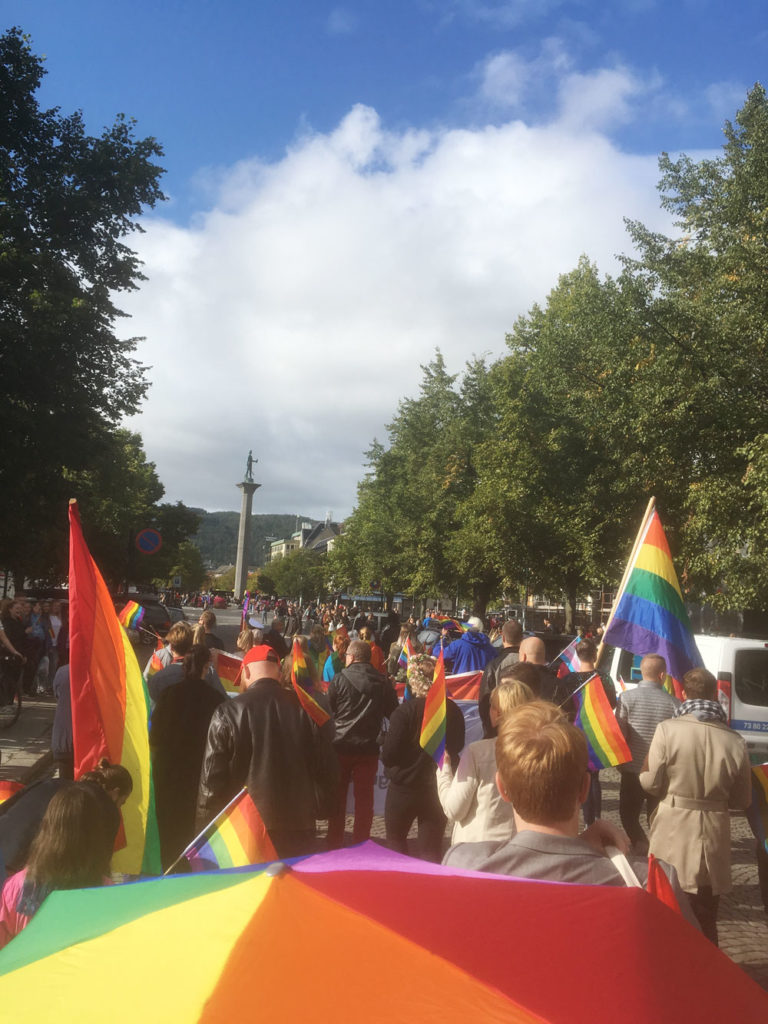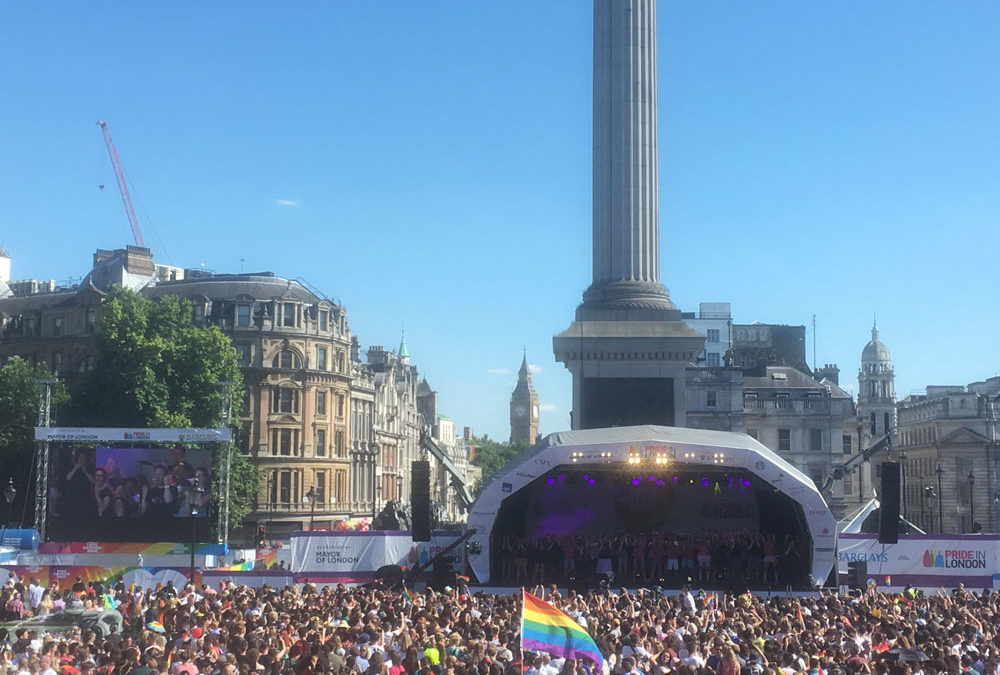Pride, Protest, Parade: Listening to Queer Voices
Blog Post
Trondheim Pride reaches its pinnacle on Saturday 14th September with what promises to be another spectacular parade. As many of us have probably heard, 2019 is a significant year in LGBT history since it marks the 50th anniversary of the New York Stonewall riots, commonly believed to be the first major public protest against the discrimination of the LGBT community.
Marking the day of June 28th in 1969, a protest march has been repeated annually, forming what we know today as the NYC Pride March. It was this march that became a model for other cities around North America and then to be taken up in other places and regions around the world as a way for local LGBT activists to stage their own public protests. Oslo Pride, for example, traces its history back to 1982, when it was known as Homodagene, before being renamed Skeive Dager, until receiving its current name in 2014.
Pride as global activism
Pride parades have enabled LGBT people to build a sense of community, to be visible and audible to larger society, and to protest the many different forms of discrimination they face. They have provided a platform for, amongst other things, protesting physical violence and institutional discrimination; for raising HIV/AIDS awareness; for demanding access to health care and self-determination of gender identity; for calling for marriage and adoption rights.
The name ‘pride’ was proposed in order to empower LGBT people and resist experiences of shame. In different parts of the world, the goals of pride parades may differ, shaped by specific histories of discrimination and diverse strategies of activism. In certain contexts of repressive authoritarian politics, pride parades have been banned. But what unites these projects is a common discourse of LGBT rights, drawing on the rhetoric of human rights and other social movements. We can think of Trondheim Pride, and its fellow pride events around the world today, as examples of globalization, drawing on a common global model while attending to local issues, thus offering a platform for different queer voices.
Different meanings for different communities
While pride attempts to unite an LGBT community, the institution of pride might at the same time mean diverse things to different members of that community. People of colour have criticized pride organisations for racism and marginalising their own voices. Likewise, trans people have protested against the centring of cis male and female experiences in pride events and persistent transphobia in the LGB community. Interestingly, many of the key figures in the initial Stonewall riots were trans women of colour. As white middle class LGBT people have gained greater access to wealth and resources in many societies, radical LGBT activists have critiqued new forms of ‘homonormativity’ that exclude more vulnerable members of the LGBT community.
Some scholars and activists have also critiqued how LGBT communities have aligned themselves with more conservative national politics as they are welcomed into majority society, what Jasbir Puar has called ‘homonationalism’. With this shift, there has been a rise in both local and multi-national companies using pride to market themselves by celebrating their own supposedly liberal values, resulting in the charge of ‘pink washing’.
Indeed, many queer activists perceive pride events as becoming commercialised parties, where everyone regardless of gender or sexuality is welcome, but which seem to be devoid of any emancipatory politics. The term LGBT itself is often questioned and in flux, with many younger generations preferring the potentially more inclusive and radical term ‘queer’ (in Norwegian ‘skeiv’, although the English and Norwegian terms have different histories and resonances).
In London, a separate UK Black Pride event is organised in order to centre the particular experience of people of African, Asian, Middle Eastern, Caribbean and Latin American decent. In Berlin, there is an alternative event to the main Christopher Street Day (CSD) parade, called Transgenialer CSD, which is explicitly anti-racist, antifascist and anti-capitalist, refusing corporate sponsorship and remaining vigilant of forms of co-option. In certain global contexts, pride events are not deemed appropriate or relevant, since they are burdened by a particular ‘Western’ experience of LGBT oppression and resistance. In 2019, while pride seems to be more globally visible than ever, the competing visions of what pride and queer activism might mean have been rendered much starker.
Pride as cultural and political festival
One of the strengths of pride parades is that they inspire a lot of participants and draw much local public and media attention. But they might also obscure the larger landscape of LGBT activities organised around longer pride festivals that lead up to the parade. These festivals often consist of political debates, film showings, educational workshops, art exhibitions, public interventions, book readings, social events, and not least, musical performances. Some of these events create safe spaces for LGBT people and their allies in order to gain strength in a sense of community and to sharpen political strategies.
Other events serve as means of social outreach and political intervention in wider society. Queer artists, activists and academics share their work and ideas to larger audiences. And participants, consisting of LGBT people and their allies, bring their own embodied experiences and in turn shape those events and their meanings. Pride festivals foster a space for a dynamic range of political and cultural activities, through which queer histories are revealed and shared, solidarity for present lived experiences is articulated, and alternative queer futures are imagined.
Trondheim Pride 2019

Trondheim Pride, now in its 23rd year, has over this last week offered an exciting array of events which offer insights into current trends, debates and struggles in LGBTQ culture and politics. Trøndelag Teater created a performance based around LGBT histories, there was a family day at the park, there was a talk about LGBT rights in Chechnya, and several slots for drop-in HIV testing were offered, just to mention a few activities on the extensive and exciting programme.
In conjunction with Trondheim Pride, Trondheim also hosted the 6th Nordic Trans Studies Network Conference which offered a forum for presentations, workshops, artist talks and film showings foregrounding trans experiences.
Sápmi Pride, the LGBT project for the Nordic region’s Indigenous Sámi community, also took place this last week in Trondheim (Tråante, in the local South Sámi language). Organized every year since 2014, Sápmi Pride has this year offered a range of debates, presentations, workshops and artistic performances. Through collaborations with Trondheim Pride and the Trans Studies Network Conference, it has raised important questions about the intersection of gender and sexuality with colonialism, capitalism and racism, as well as the co-option of mainstream LGBT politics.
In these ways, Trondheim Pride has not only become a significant node in a larger global network of pride festivals. It attempts to deal with timely and urgent topics on an LGBT agenda for both the queer community and wider society. In particular this year, it has offered more space to the diversity of voices within the heterogenous LGBT community as well as demonstrating sensitivity to the ways in which LGBT identities can intersect with other marginalized identities.
Trondheim Pride in a way asks us: What are the pressing issues for queer communities today? What work needs to be done within and beyond the LGBT community? And what solidarities must we forge in order to work toward greater social justice, both locally and globally?
Queer voices
On Saturday, organisers will be hoping to beat last year’s record of around 10,000 people at the parade. Even if the weather is forecast to be cold and rainy, there is little doubt that costumes will be loud, demonstrators will be vocal, placards will be creative, and spirits will be high.
While those participating in the parade are all marching in solidarity with LGBT rights, everyone will bring their own unique perspective to the parade and will have their own individual political priorities and aspirations. In line with the explorations of musical protest by musicologist Andrea Bohlman, I believe there is much we can learn about embodied experiences of queerness, discrimination and resistance, as well as aspirations for alternative queer futures, from listening to those diverse voices, stories and cultural expressions represented and performed in the parade. If you listen carefully enough, perhaps you will hear me and the rest of Kor Hen, Trondheim’s queer choir, singing too.
References:
- Bohlman, Andrea F. 2016. «Solidarity, Song, and the Sound Document.» The Journal of Musicology 33 (2):232-269.
- Cruz-Malavé, Arnoldo, and Martin F. Manalansan, eds. 2002. Queer Globalizations: Citizenship and the Afterlife of Colonialism. New York & London: New York University Press.
- Duggan, Lisa. 2002. ‘The New Homonormativity: The Sexual Politics of Neoliberalism’. In Materializing Democracy: Toward a Revitalized Cultural Politics, edited by R. Castronovo and D. D. Nelson, 175-94. Durham: Duke University Press.
- Giorgi, Liana, Monica Sassatelli, and Gerard Delanty, eds. 2011. Festivals and the Cultural Public Sphere. London: Routledge.
- Puar, Jasbir K. 2007. Terrorist Assemblages: Homonationalism in Queer Times. Durham & London: Duke University Press.

Thomas R. Hilder
Thomas R. Hilder is a writer, teacher, researcher, musician and activist. He has been interested in LGBT politics for over a decade and is currently researching LGBT choirs in London and Rome. Earlier research has focused on Sámi popular music and the politics of Indigeneity. In Trondheim he is steering committee chair of the local queer choir, Kor Hen. He is Associate Professor in Ethnomusicology at NTNU.

